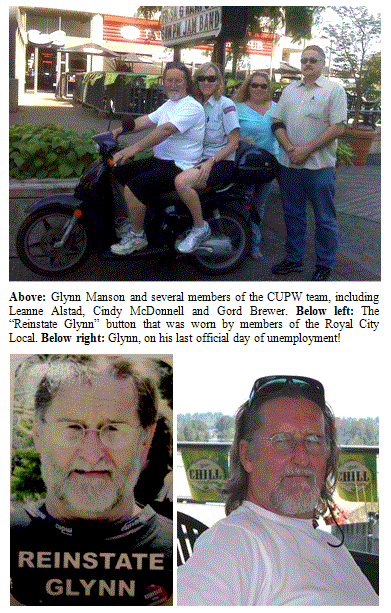FORMER PRESIDENT GLYNN MANSON REINSTATED!
On July 27, 2010, former Royal City Local President Glynn Manson was reinstated to his employment as a result of an arbitration decision by Arbitrator Joan Gordon. Manson was discharged by Canada Post on April 16, 2009 on the grounds that he “incited a concerted work disruption”. Canada Post specifically alleged that his actions as a union representative “directly contributed” to an unlawful work disruption and “resulted in the delay of the IKEA mailing” by a “majority of Letter Carriers” in the New Westminster depot.

The incident in question took place on Friday, March 13, 2010, when Canada Post unilaterally compressed the delivery of an IKEA mailing from three days to a single day without agreement from the Union. The justification for the compression was attributed to Canada Post’s inability to put in place an internal distribution system that would ensure the timely apportionment of IKEA mailings to the affected depots throughout Canada. In fact, the single day compression was the second such incident within a three week period. The compression of householder mailings represents a significant increase in workload for Letter Carriers, as routes are assessed on the basis that an employee will only deliver to a percentage of his or her calls. While the Collective Agreement allows for compression in certain circumstances, compression should always be an exception to the norm rather than a repeating pattern.
On March 13, 2009, New Westminster employees were again informed that IKEA flyers would be compressed into a single day delivery. The situation quickly became inflamed, in part, because of management’s failure to properly compensate certain employees for the previously compressed IKEA mailing. Management also refused to release keys and threatened employees with discipline and/or discharge. In assessing whether Manson had actually incited a work disruption, Arbitrator Gordon considered the conflicting evidence in terms of what was said at a floor meeting that immediately preceded the departure of employees. One corporate witness (Mike Locke) went so far as to claim that Manson had announced, during the meeting, that the flyers would not be delivered. However, Arbitrator Gordon found Locke’s claim to be unfounded and accepted the Union’s evidence of what transpired:
I have preferred the evidence of the Union’s witnesses, finding their memories of material events to be somewhat clearer than, and to have more completely withstood cross-examination, than that of the Employer’s witnesses. I also found the former witnesses’ version of events to be more consistent with the preponderance of the surrounding probabilities.
While accepting that Manson did not actually tell employees not to deliver the IKEA flyers, Arbitrator Gordon nonetheless accepted that some of his remarks likely had the effect of inciting other employees. In assessing the appropriateness of discharge, Arbitrator Gordon noted the testimony of Rachel [Doug] Andrus, who made the decision to discharge:
…those were the only options within the collective agreement. I felt that the collective agreement prevented me from imposing a penalty in between the five day suspension and termination. I got counsel from the Labour Relations group and felt that the collective agreement tied my hands. They counselled me that I only had two options.
In considering the penalty of discharge, Arbitrator Gordon took into consideration several mitigating factors, including Manson’s years of service, the spontaneous nature of his comments at the floor meeting, the absence of progressive discipline, and the fact that Andrus did not bother to hold a disciplinary interview, thereby precluding the opportunity for proper consideration of the Grievor’s explanations. In the result, Arbitrator Gordon substituted a ten day suspension in place of discharge. Accordingly, Manson is now entitled to approximately fifteen (15) months of lost wages and benefits.
In solidarity,
Ken Mooney
Regional Grievance Officer

